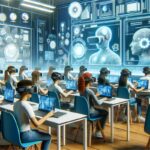In the fast-paced and ever-evolving modern world, continuous education is not just a personal asset but a necessity for societal progress. The pursuit of knowledge and skills beyond traditional schooling, often referred to as lifelong learning, plays a critical role in individual growth, economic development, and the overall well-being of societies. This article delves into the reasons why continuing education is essential for people and populations, touching upon the concept of andragogy as a key element in adult education.
Adapting to Technological and Economic Changes
One of the most pressing reasons for ongoing education is the rapid advancement of technology. As new technologies emerge and industries evolve, the skill sets required in the workforce undergo significant transformations. Continuous learning ensures that individuals and, by extension, societies remain adaptable and competitive. It prevents the workforce from becoming obsolete and helps in bridging the gap between emerging job roles and existing skills.
Enhancing Personal Development and Well-being
Education extends beyond professional development; it is also a powerful tool for personal growth. Engaging in lifelong learning activities enhances cognitive abilities, fosters creativity, and promotes a deeper understanding of the world. This form of personal development leads to improved self-esteem, greater life satisfaction, and better mental health, contributing to the overall well-being of individuals.
Fostering a Culture of Innovation
Educated societies are innovation-driven societies. Continuous learning fosters a culture where questioning, exploring, and inventing are encouraged. This culture is essential for addressing complex global challenges, such as climate change, health crises, and economic instability. A population that values and pursues education is more likely to produce innovative solutions to these pressing issues.
Bolstering Economic Growth and Stability
A well-educated population is a key driver of economic growth and stability. Lifelong learning contributes to a skilled and knowledgeable workforce, which in turn attracts investment and stimulates economic development. It also plays a crucial role in reducing unemployment and underemployment, as individuals who engage in continuous learning are more adaptable to changing job markets.
Promoting Social Inclusion and Democracy
Education is a great equalizer. It promotes social inclusion by providing individuals from diverse backgrounds with the tools to participate fully in society. An educated population is also crucial for the functioning of democracy. Informed citizens are better equipped to make reasoned decisions, engage in public discourse, and hold their leaders accountable.
Andragogy: Adult Learning in a Changing World
The concept of andragogy, which focuses on the methods and principles of adult education, is critical in the context of lifelong learning. Adults learn differently than children, often requiring a practical, self-directed approach that draws on their life experiences. Andragogy emphasizes the need for learning to be relevant to adults’ personal and professional lives and acknowledges the wealth of knowledge they bring to the learning process. This approach to adult education is essential in ensuring that learning is accessible, engaging, and effective for adults.
Challenges in Lifelong Learning
Despite the clear benefits, lifelong learning faces challenges, including accessibility, affordability, and the recognition of informal learning. Addressing these challenges requires a collaborative effort from governments, educational institutions, and businesses. Policies that promote and support continuous learning, such as funding for adult education programs and incentives for employers to invest in workforce training, are critical.
Technology as a Facilitator of Continuous Learning
The rise of digital technology has revolutionized the accessibility of education. Online courses, virtual workshops, and digital resources have made learning more flexible and inclusive. These technological advancements allow individuals to learn at their own pace, on their schedule, breaking down traditional barriers to education.
The Role of Businesses in Promoting Education
Businesses play a crucial role in promoting continuous learning. By investing in employee training and development programs, businesses can not only enhance their competitiveness but also contribute to the overall education of the population. Partnerships between businesses and educational institutions can also create opportunities for practical, hands-on learning, aligning education with real-world skills.
Conclusion
Continuing education is a cornerstone of personal and societal development. It equips individuals with the skills needed to navigate a rapidly changing world, fosters innovation, supports economic growth, and promotes a more inclusive and democratic society. The principles of andragogy play a crucial role in making education effective and relevant for adults, ensuring that lifelong learning is a feasible and attractive pursuit for all. As the world continues to evolve, the importance of continuous education will only grow, making it an indispensable part of societal progress.






